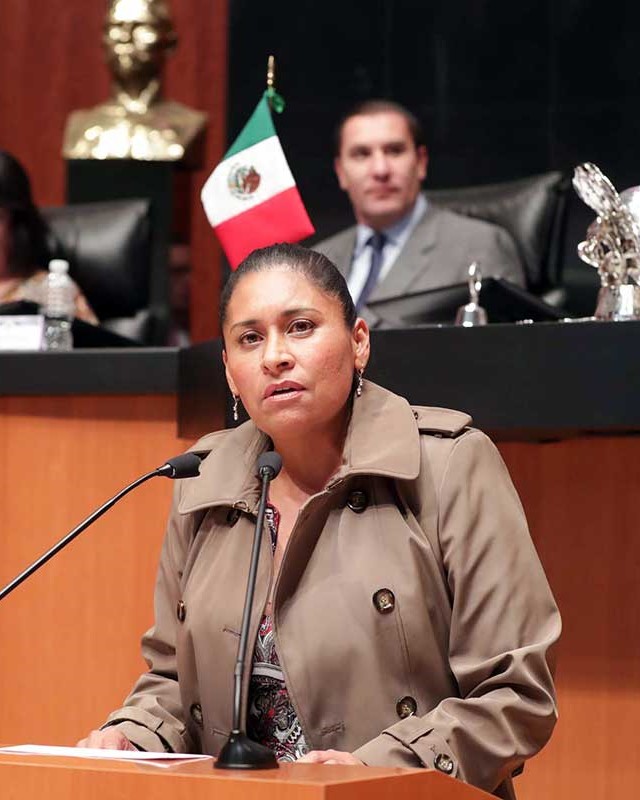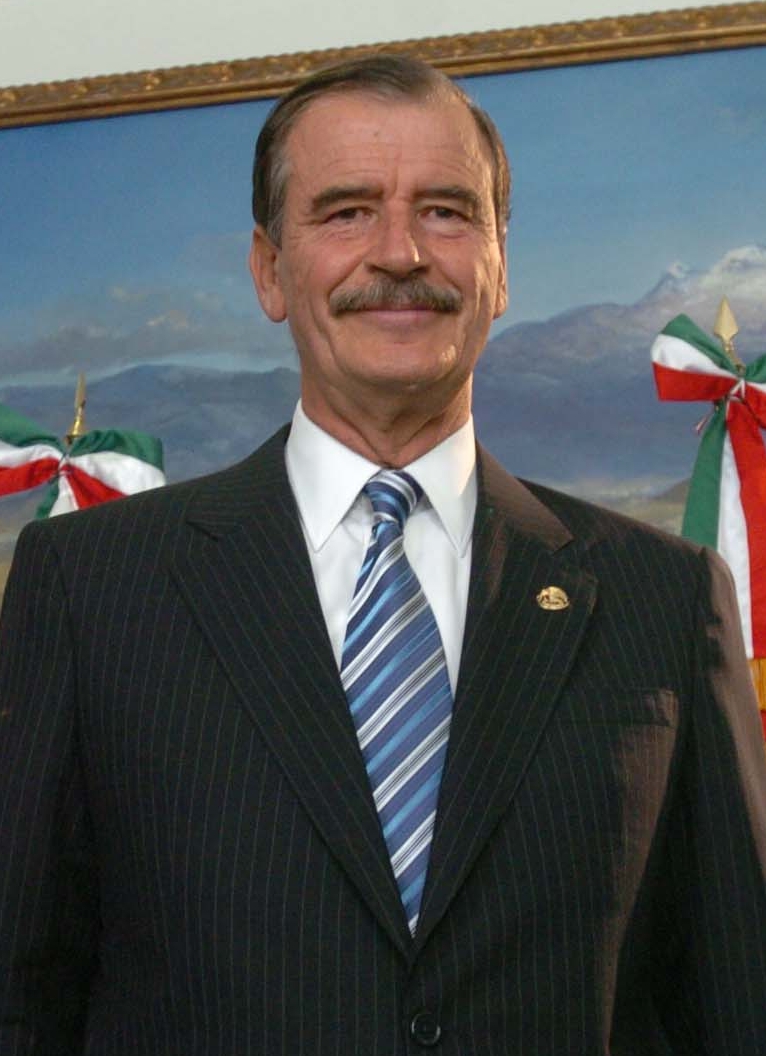|
2023 Tamaulipas Special Senate Election
A By-election, special election was held in the Mexican state of Tamaulipas on 19 February 2023 to fill the state's vacant seat in the Senate of the Republic (Mexico), Senate of the Republic. It was won by José Ramón Gómez Leal of the National Regeneration Movement (Morena), who received over 72% of the votes cast in a three-way race. Background Américo Villarreal Anaya of Morena was elected to Tamaulipas's first Senate seat in the 2018 Mexican general election, 2018 general election but resigned his position to contend for the governor of Tamaulipas, governorship of Tamaulipas in the 2022 Mexican local elections, 2022 election; he was replaced by his Legislator#Substitute legislator, alternate, Faustino López Vargas, on 10 January 2022. Villarreal won the gubernatorial election held on 5 June and, except for a three-day period in September, did not return to his Senate seat. López Vargas was killed in a traffic accident in Trancoso Municipality, Zacatecas, Trancoso, Zacatec ... [...More Info...] [...Related Items...] OR: [Wikipedia] [Google] [Baidu] |
José Ramón Gómez Leal
José Ramón Gómez Leal (born 7 July 1977) is a Mexican politician affiliated with the National Regeneration Movement party. He was a local deputy of the Congress of Tamaulipas from 2010 to 2013 for the National Action Party. As well as Delegate of Development Programs in the state of Tamaulipas from 2018 to 2021. In 2023 he was elected as Senator of the Republic for the LXV Legislature of the Congress of the Union. Early years José Ramón Gómez Leal was born in Reynosa, Tamaulipas, on July 7, 1977. He studied high school at the Monterrey Institute of Technology and Higher Education and graduated from Saint Mary's University in San Antonio, Texas. Political career From 2008 to 2010 he was councilor of the municipality of Reynosa for the National Action Party, during the municipal presidency of Oscar Luebbert Gutiérrez. In the 2010 state elections, he was elected deputy for proportional representation of the Congress of Tamaulipas, representing the National Action ... [...More Info...] [...Related Items...] OR: [Wikipedia] [Google] [Baidu] |
Secretariat Of The Interior (Mexico)
The Secretariat of the Interior (; SEGOB) is the executive department of the Mexican government concerned with the country's domestic affairs, the presenting of the president's bills to Congress of Mexico, Congress, their publication in the Official Journal of the Federation (Mexico), ''Official Journal of the Federation'', and certain issues of national security. The country's principal intelligence agency, National Intelligence Centre (Mexico), CNI, is directly answerable to the Secretary of the Interior. The Secretary is a member of the president's Mexican Executive Cabinet, Cabinet and is, given the Constitution of Mexico, constitutional implications of the post, the most important cabinet member. Additionally, in case of both temporary and absolute absences of the president, the Secretariat of the Interior (Mexico), Secretary of the Interior assumes the president's executive powers President of Mexico#Succession, provisionally. The Office is practically equivalent to Minist ... [...More Info...] [...Related Items...] OR: [Wikipedia] [Google] [Baidu] |
Instituto Nacional Electoral
The Instituto Nacional Electoral (INE) (Spanish for ''National Electoral Institute'') (formerly Federal Electoral Institute) (, IFE) is an autonomous, public agency responsible for organizing federal elections in Mexico, that is, those related to the election of the President of the United Mexican States, the members of the Congress of the Union as well as elections of authorities and representatives at local and state levels. The agency's president is , appointed in 2023 for a 9-year term. History Background In 1917, with the promulgation of the Constitution of Mexico, the ''Junta Empadronadora'', the local Computing Councils and the Electoral Colleges were placed in charge of organizing and supervising the election of the president, the Chamber of Deputies, and the Senate. This meant municipal presidents were granted a great deal of control over the election process, due to the location and amount of polling station within their municipalities. The Federal Electoral ... [...More Info...] [...Related Items...] OR: [Wikipedia] [Google] [Baidu] |
Olga Patricia Sosa Ruiz
Olga Patricia Sosa Ruiz is a Mexican politician, who serves as a federal deputy with leave for the LXIV Legislature of the Mexican Congress, LXIV Legislature of the Chamber of Deputies for the 8th federal electoral district of Tamaulipas, 8th district of Tamaulipas, after winning the district in the 2018 federal elections by the coalition "Juntos Haremos Historia" (Together We Will Make History). She had already held this position during the LXI Legislature (2009-2012), but being a substitute for José Francisco Rábago Castillo, both for the PRI (without having taken an oath). She also served as a local deputy for the LXII Legislature of the Congress of Tamaulipas (2013-2016) for the "Todos Somos Tamaulipas" (We Are All Tamaulipas) Coalition (by the PRI and the Green Party) and for the local district XXII, after winning in the 2013 state elections. During her term as federal deputy (2018-2021), she presented a total of 82 initiatives, of which 15 have been approved, making her w ... [...More Info...] [...Related Items...] OR: [Wikipedia] [Google] [Baidu] |
2024 Mexican Senate Election
The 2024 Mexican Senate election was held on 2 June 2024 as part of the 2024 general election. All 128 seats in the Senate of Mexico were up for election, with the winners serving six-year terms in the 66th and 67th Congresses. Those elected for the first time will be eligible for re-election in the 2030 election. Before the election, the Senate was controlled by the ruling coalition—a bloc of senators from the National Regeneration Movement (Morena), the Ecologist Green Party of Mexico (PVEM), the Labor Party (PT), and the defunct Social Encounter Party (PES)—who held the majority. The ruling coalition formed an electoral alliance called '' Sigamos Haciendo Historia'', consisting of Morena, PVEM, and PT, with the goal of securing a supermajority to pass outgoing President Andrés Manuel López Obrador's "Plan C," a package of eighteen constitutional amendments. Opposition parties the Institutional Revolutionary Party (PRI), the National Action Party (PAN), and the Party ... [...More Info...] [...Related Items...] OR: [Wikipedia] [Google] [Baidu] |
LXV Legislature Of The Mexican Congress
The LXV Legislature of the Congress of the Union (65th Congress) was a meeting of the legislative branch of Mexico, composed of the Chamber of Deputies (Mexico), Chamber of Deputies and the Senate of the Republic (Mexico), Senate of the Republic. It convened on 1 September 2021, and ended on 31 August 2024, during the final three years of President Andrés Manuel López Obrador's Presidency of Andrés Manuel López Obrador, presidency. The Chamber of Deputies was elected in the 2021 Mexican legislative election, 2021 legislative election, in which ''Juntos Hacemos Historia'', consisting of the Morena (political party), National Regeneration Movement (Morena), the Labor Party (Mexico), Labor Party (PT), and the Ecologist Green Party of Mexico (PVEM), kept their majority but did not reach the two-thirds supermajority required to pass López Obrador's proposed constitutional reforms. This legislature was notable for being the first where deputies were eligible for reelection, with 1 ... [...More Info...] [...Related Items...] OR: [Wikipedia] [Google] [Baidu] |
Ecologist Green Party Of Mexico
The Ecologist Green Party of Mexico (, , PVEM or PVE) is a green political party in Mexico. Founded in 1986, the party is associated with Jorge González Torres and his son Jorge Emilio González Martínez. It has seldom gotten more than 10% of the vote nationwide, but in the 21st century has joined alliances with different major parties ( PAN in the federal elections of 2000, PRI from 2003 to 2018, and most recently Morena from 2019 on). It is not recognized as a fellow green party by the European Green Party, and is known for its heavy use of advertising, and for (at times) taking stances on issues not usually associated with the international Green movement (such as support for capital punishment and extension of school hours). History The party was founded in 1986 under the name Mexican Green Party () and its first leader was Jorge González Torres. It participated in the 1991 federal elections for the first time as an independent bloc, under the name Ecologist Part ... [...More Info...] [...Related Items...] OR: [Wikipedia] [Google] [Baidu] |
Party Of The Democratic Revolution
The Party of the Democratic Revolution (, , PRD) is a state-level social democracy, social democratic political party in Mexico (previously national, until 2024). The PRD originated from the Democratic Current, a political faction formed in 1986 from the Institutional Revolutionary Party (PRI). The PRD was formed after the contested 1988 Mexican general election, general election in 1988, which the PRD's immediate predecessor, the National Democratic Front (Mexico), National Democratic Front, believed was rigged by the PRI. This sparked a movement away from the PRI's authoritarian rule. As of 2023, the PRD was a member of the Fuerza y Corazón por México (Strength and Heart for Mexico) coalition. Internationally, the PRD was a member of the Progressive Alliance. The members of the party are known colloquially in Mexico as ''Perredistas''. In 2024, the party failed to reach the necessary percentage of votes to keep its registration as a national political party. History Early o ... [...More Info...] [...Related Items...] OR: [Wikipedia] [Google] [Baidu] |
Institutional Revolutionary Party
The Institutional Revolutionary Party (, , PRI) is a List of political parties in Mexico, political party in Mexico that was founded in 1929 as the National Revolutionary Party (, PNR), then as the Party of the Mexican Revolution (, PRM) and finally as the PRI beginning in 1946. The party held uninterrupted power in the country and controlled the President of Mexico, presidency twice: the first one was for 71 years, from 1929 to 2000, the second was for six years, from 2012 to 2018. The PNR was founded in 1929 by Plutarco Elías Calles, Mexico's paramount leader at the time and self-proclaimed (Supreme Chief) of the Mexican Revolution. The party was created with the intent of providing a political space in which all the surviving leaders and combatants of the Mexican Revolution could participate to solve the severe political crisis caused by the assassination of president-elect Álvaro Obregón in 1928. Although Calles himself fell into political disgrace and was exiled in 1936 ... [...More Info...] [...Related Items...] OR: [Wikipedia] [Google] [Baidu] |
National Action Party (Mexico)
The National Action Party (, PAN) is a Conservatism, conservative List of political parties in Mexico, political party in Mexico founded in 1939. It is one of the main political parties in the country, and, since the 1980s, has had success winning local, state, and national elections. In the historic 2000 Mexican general election, PAN candidate Vicente Fox was elected president, the first time in 71 years that the Mexican presidency was not held by the traditional ruling party, the Institutional Revolutionary Party, PRI. Six years later, PAN candidate Felipe Calderón succeeded Fox after winning the 2006 Mexican general election, 2006 presidential election. In the 2006 Mexican general election, 2006 legislative elections, the party won 207 out of 500 seats in the Chamber of Deputies (Mexico), Chamber of Deputies and 52 out of 128 Senate of the Republic (Mexico), senators. In the 2012 Mexican general election, 2012 legislative elections, the PAN won 38 seats in the Senate and 114 ... [...More Info...] [...Related Items...] OR: [Wikipedia] [Google] [Baidu] |
Labour Party (Mexico)
The Labor Party ( , PT; also known as the Workers Party) is a socialist political party in Mexico. It was founded on 8 December 1990. The party is currently led by Alberto Anaya. Following the 2018 election, the PT became the third-largest political party in the Chamber of Deputies with 61 deputies, after Morena with 191 and the PAN with 81. Political maneuvering briefly established the PRI as the third-largest party in August 2020, although it later turned out that the PT and the PRI were tied with 46 seats each after doubtful PRD deputy defections in favor of the PRI. It received 6.46% of the total votes cast in the 2024 presidential election, becoming the sixth national political force. It has 49 deputies and 6 senators in the LXVI legislature of the Congress of the Union. History Foundation Initial History Following the coordination of several social groups, including the Independent Teachers' Movement, the National Union of Agricultural Workers (UNTA), the Nationa ... [...More Info...] [...Related Items...] OR: [Wikipedia] [Google] [Baidu] |
National Electoral Institute
The Instituto Nacional Electoral (INE) (Spanish for ''National Electoral Institute'') (formerly Federal Electoral Institute) (, IFE) is an autonomous, public agency responsible for organizing federal elections in Mexico, that is, those related to the election of the president of Mexico, President of the Mexico, United Mexican States, the members of the Congress of the Union as well as elections of authorities and representatives at local and state levels. The agency's president is , appointed in 2023 for a 9-year term. History Background In 1917, with the promulgation of the Constitution of Mexico, the ''Junta Empadronadora'', the local Computing Councils and the Electoral Colleges were placed in charge of organizing and supervising the election of the president, the Chamber of Deputies (Mexico), Chamber of Deputies, and the Senate (Mexico), Senate. This meant municipal presidents were granted a great deal of control over the election process, due to the location and amount o ... [...More Info...] [...Related Items...] OR: [Wikipedia] [Google] [Baidu] |







